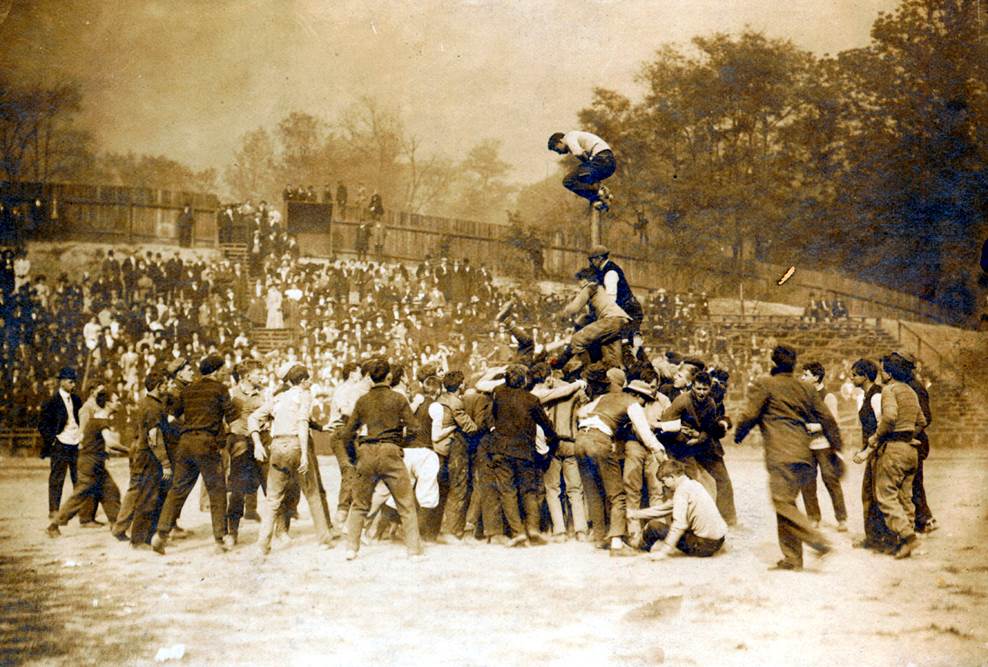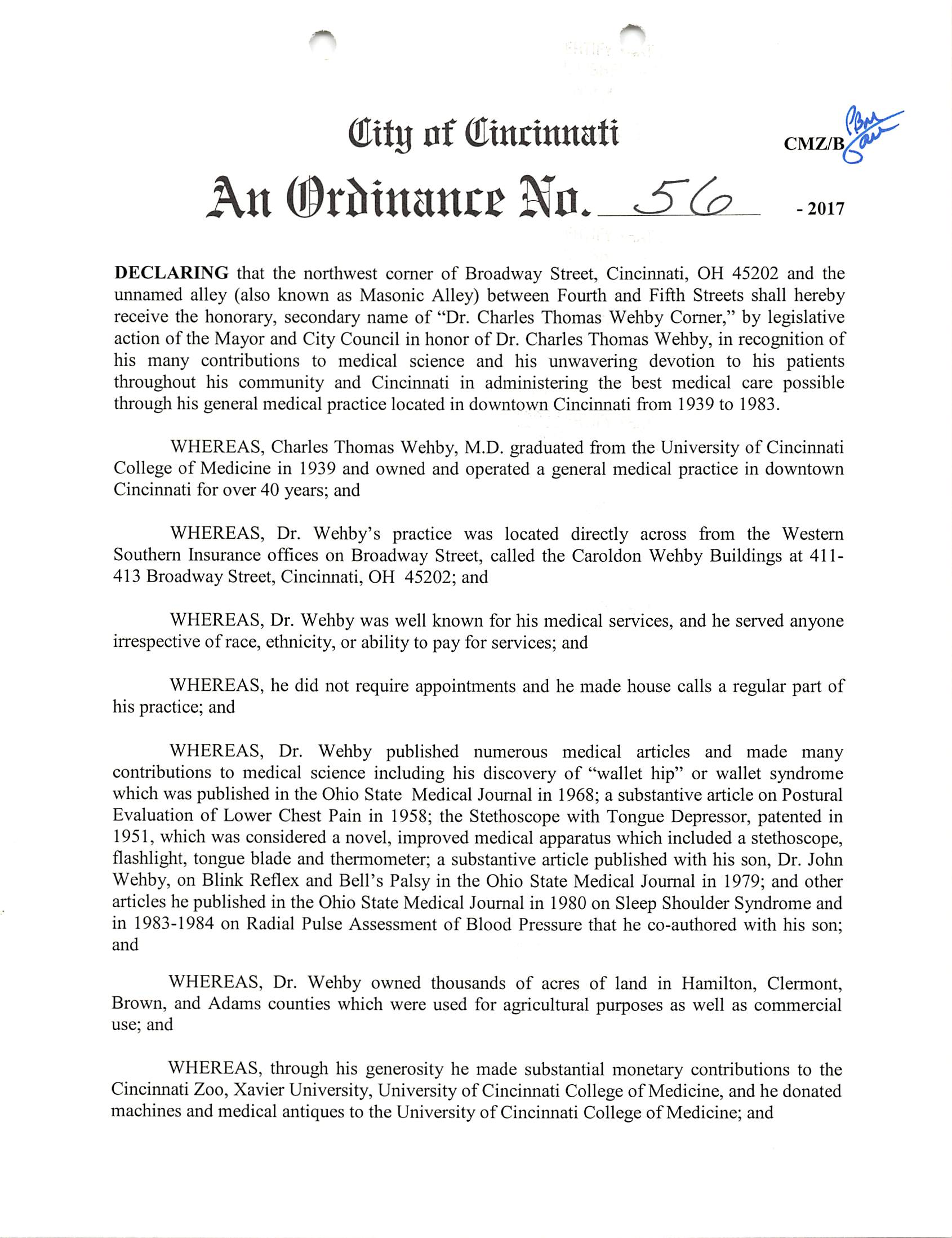Using the Production Room in the Student Technology Resources Center (STRC), Nick Skowron recorded his version of Elvis’s “I Can’t Help Falling in Love with You” as part of an assignment for his Music Video class offered by the Digital Media Collaborative.
Category Archives: UC Libraries
The John Miller Burnam Classics Library Hosts “An Evening with Ovid”
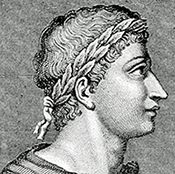
Ovid
Join the John Miller Burnam Classics Library 5:30-7:30 p.m., Thursday, March 29 in 417 Blegen Library for “An Evening with Ovid,” an event celebrating the life and work of the Roman poet. We will raise a glass in his honor in connection with his birthday and the 2,000-year anniversary of his death.
The evening will begin with welcoming remarks by Rebecka Lindau, head of the Classics Library. Bridget Langley, visiting assistant professor in the College of Arts and Sciences’ Department of Classics, will give a brief presentation of Ovid’s life and work. Colin Shelton, adjunct professor in Classics, will follow with a reading of two of Ovid’s Metamorphoses in Latin and in translation by modern English poet Ted Hughes. Jenny Doctor, head of the Albino Gorno Memorial Music Library, will introduce a musical performance by modern English composer Benjamin Britten, “Six Metamorphoses after Ovid,” featuring College-Conservatory of Music oboist Yo Shionoya.
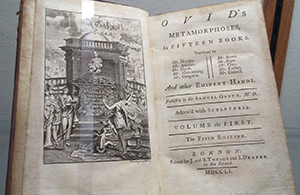
Ovid’s Metamorphoses
The evening will conclude with refreshments Ovid and his contemporaries would have enjoyed. The event will be presided over by Emperor Augustus himself in the form of a copy of the original marble head discovered at Troy during an excavation led by UC’s Classics Department. Additionally, the library will feature a book exhibition with works of Ovid, including rare editions of the Metamorphoses.
The event is free and open to all. RSVP to Cade Stevens at stevencd@ucmail.uc.edu or 513-556-1314 by Friday, March 23.
Feb. 28 Digital Humanities Speaker Series to Feature Two Speakers from the University of Iowa
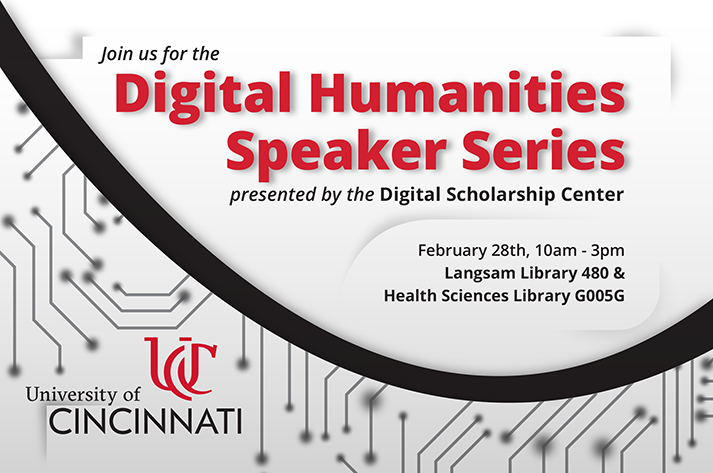
Sponsored by the Digital Scholarship Center, the next Digital Humanities Speaker Series event, scheduled for Wed., Feb. 28 in both the Walter C. Langsam Library and the Donald C. Harrison Health Sciences Library, will feature David Eichmann, director and associate professor in the School of Library and Information Science, and Blaine Greteman, associate professor of English, both from the University of Iowa. Both sessions are free and open to all.
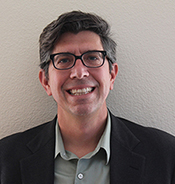
Blaine Greteman
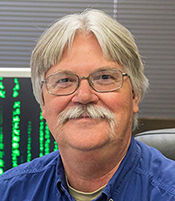
David Eichmann
10:00 a.m.-noon: [Keynote]: “Networking Print: Small Worlds, Phase Transitions, and Hidden Histories in 500,000 Early English Books.” Led by: Blaine Greteman. Co-Presenter: David Eichmann. Location: Walter C. Langsam Library 462
Noon-12:45 p.m.: Lunch- all welcome, Langsam 462
1:30-3:30 p.m.: “Identification of Collaborator Networks in Biomedicine (and How They Relate to the Printing/Publishing Community of Pre-1800 England).” Led By: David Eichmann. Co-Presenter: Blaine Greteman. Location: Donald C. Harrison Health Sciences Library, Dr. Stanley B. Troup Learning Space (MSB G005G)
David Eichmann has conducted research in relational database theory, software reuse and reengineering, web search engines and intelligent agents, biomedical informatics and ontology-based research profile harvesting and visualization. His current projects include Shakeosphere (modeling the social network of the print community in England 1540-1800), CTSAsearch (aggregating research profiles from 70+ institutions), CD2H (an informatics coordinating center for the CTSA consortium) and Linked Data for Libraries (LD4L) (where he is part of a consortium exploring the next generation of library catalogs).
Blaine Greteman writes regularly for popular publications including The New Republic, Slate, TIME and The Week. His first book was The Poetics and Politics of Youth in Milton’s England (Cambridge University Press, 2013); his forthcoming book, Networking Early English Print (Stanford University Press), is based on Shakeosphere, a digital project built in collaboration with David Eichmann. Greteman holds an M.Phil from Oxford, where he attended on a Rhodes Scholarship, and a Ph.D. from U.C. Berkeley.
Located in the Walter C. Langsam Library, the Digital Scholarship Center (DSC) is a joint venture of the University of Cincinnati Libraries and the College of Arts and Sciences. Launched in September 2016 as an academic center, the DSC provides faculty and students across the university with support for digital project conception, design and implementation. For more about the Digital Scholarship Center, visit http://dsc.uc.edu.
Love Data Week 2018
“Hey Data-ful, do you come here often?” 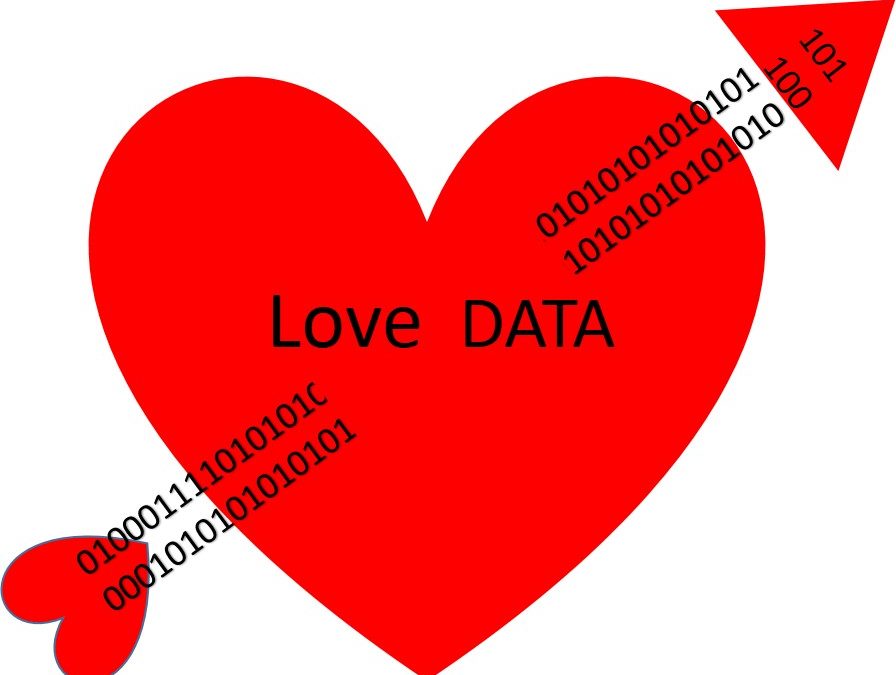
“Why yes, yes I do, You can always find me in the repository.”
It is Love Data Week and time to show your love for your research output.
What is Love Data Week (#LDW18)?
From the Love Data Week website – http://lovedataweek.org/
Similar to Open Access Week, the purpose of the Love Data Week (LDW) event is to raise awareness and build a community to engage on topics related to research data management, sharing, preservation, reuse, and library-based research data services. We will share practical tips, resources, and stories to help researchers at any stage in their career use good data practices.
Love Data Week is a social media event coordinated by research data specialists, mostly working in academic and research libraries or data archives or centers. We believe research data are the foundation of the scholarly record and crucial for advancing our knowledge of the world around us. If you care about research data, please join us! This event is open to any institution – small, large, research intensive or not, so please feel free to share, adapt, and improve upon it. We encourage individuals, data librarians or otherwise, to participate in the campaign.
Indian Clubs and German-American Health Promotion
By: Kevin Grace
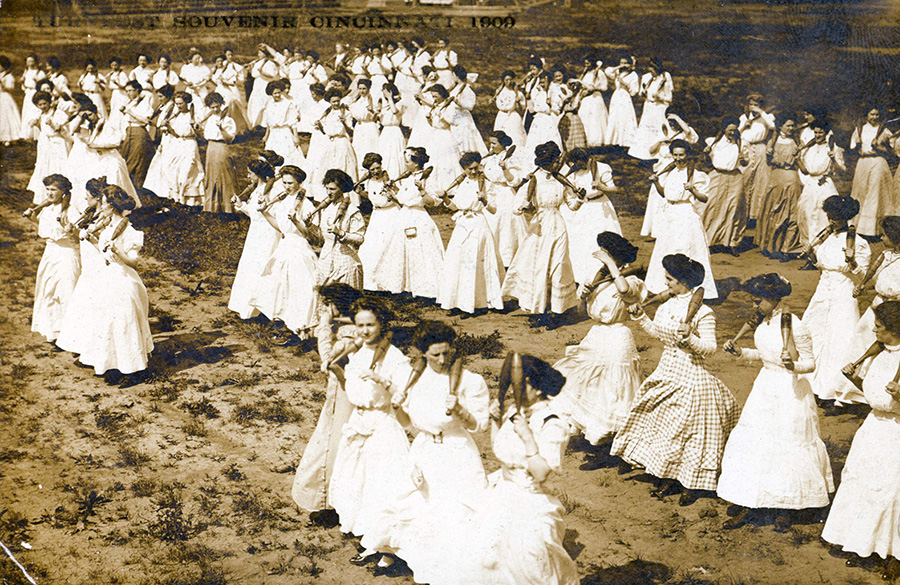 On a hot June day in 1909, thousands of people gathered at the Carthage Fairgrounds just beyond the city limits of Cincinnati. There on the nubby dusty infield of the racetrack, groups of women clad in long dresses divided themselves into squads of threes and fours and faced the spectators. In each hand they held an “Indian club,” a standard piece of gymnasium equipment at the time, and as the crowd watched, the women began a series of intricate, graceful movements, swinging the clubs up from their sides and around their bodies, crisscrossing the clubs in patterns that emphasized coordination and discipline. The demonstration was just one of several exhibits of mass exercises at the quadrennial Turnfest that was hosted by the Cincinnati Turners organizations that year, a fitting location as the American Turner movement was founded by German immigrants in Cincinnati in 1848.
On a hot June day in 1909, thousands of people gathered at the Carthage Fairgrounds just beyond the city limits of Cincinnati. There on the nubby dusty infield of the racetrack, groups of women clad in long dresses divided themselves into squads of threes and fours and faced the spectators. In each hand they held an “Indian club,” a standard piece of gymnasium equipment at the time, and as the crowd watched, the women began a series of intricate, graceful movements, swinging the clubs up from their sides and around their bodies, crisscrossing the clubs in patterns that emphasized coordination and discipline. The demonstration was just one of several exhibits of mass exercises at the quadrennial Turnfest that was hosted by the Cincinnati Turners organizations that year, a fitting location as the American Turner movement was founded by German immigrants in Cincinnati in 1848.
The festival attracted Turner athletes from around the country and around the world, all journeying to Cincinnati as they had to other cities in past years to exhibit the Turner philosophical ideals of physical and mental fitness, and civic responsibility. In the days before the ladies’ exercise with Indian clubs, students in the city’s schools demonstrated the skills they had learned in physical education classes, a mainstay of the public school academic program in Cincinnati. The proper uses of parallel bars, wands and rings, and the pommel horse were performed in front of school officials and Turner judges. It was a program already several decades old, begun in earnest after the Civil War when secondary and primary teachers learned the techniques of physical fitness and health promotion under the leadership of Turner instructors. Continue reading
Mozart in the Library: Act IV
Ever wonder what people are playing while they are practicing the keyboards in Langsam and CCM Libraries? Jay Sinnard, manager of the Student Technology Resources Center, did so he asked one student if he could listen in.
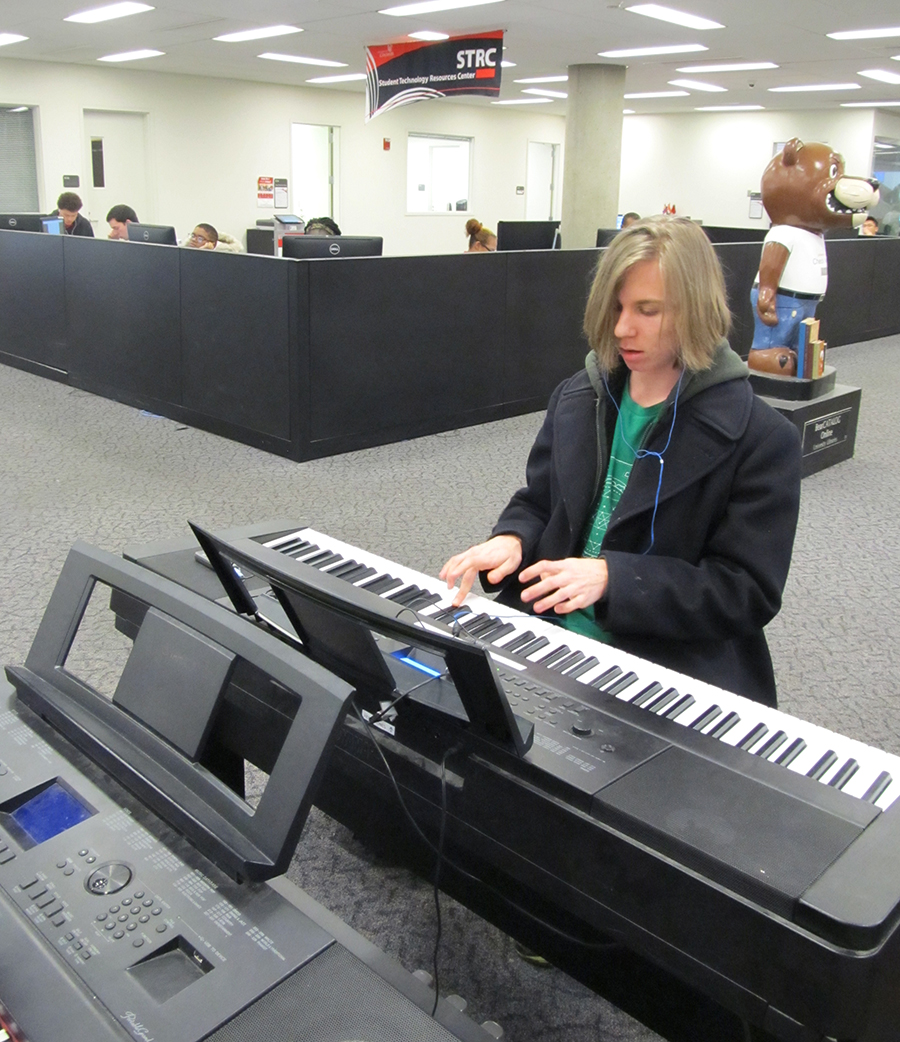
Caleb Sund, 1st year psychology major
A collaboration between UC Libraries and the College-Conservatory of Music (CCM), the keyboards are open to anyone wanting to play on a first come-first served basis, but bring your own headphone as they are required.
Join Us for Poetry at a Glance “Black History through Poetry”
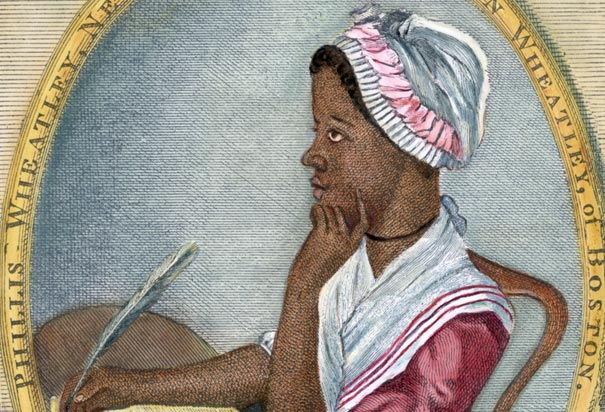 In celebration of Black History Month, UC Libraries is holding an event featuring poetry and poet Phillis Wheatley, the first published African-American poet.
In celebration of Black History Month, UC Libraries is holding an event featuring poetry and poet Phillis Wheatley, the first published African-American poet.
February 22, 2:00 – 3:30pm
462 Langsam Library
At the event, Kevin Grace, head of the Archives and Rare Books Library and university archivist, will present the Phillis Wheatley Poetry Book, part of the library’s rare books collection. Following, there will be poetry readings by UC students, staff and guests. Those in attendance can also enjoy a taste of cultural cuisine. The event is free and open to all.
Phillis Wheatley (1753-1784) is the first African American, and one of the first women, to publish a book of poetry in the colonies in 1773. At the age of eight, she was kidnapped from West Africa, enslaved and sold to a family in Boston where her owner’s wife and children taught her to read and write English, Greek and Latin. She published her first poem at the age of 12.
A table display featuring African-American poets and poetry is on display on the 4th floor of Langsam. A bibliography of the works on display is available online.
UC Libraries Offering LabArchives Electronic Lab Notebook to UC Research Community
The University of Cincinnati Libraries, with funding from the Office of the Provost, is pleased to present the LabArchives Electronic Lab Notebook to the UC research community.
An enterprise-wide license with LabArchives has been obtained for UC and will last until June 30, 2018.*
LabArchives is the leading secure and intuitive cloud-based Electronic Lab Notebook (ELN) application enabling researchers to easily create, store, share and manage their research data. Far more than an ELN, LabArchives provides a flexible, extensible platform that can be easily customized to match your lab’s workflow providing benefits to Principal Investigators, lab managers’ staff, post doctoral fellows and grad students. LabArchives can be integrated seamlessly with GraphPad Prism, MS-Office, PubMed, BOX, Learning Management Systems and a number of other software tools that are used extensively by researchers of the Academic Health Center and university wide. Additionally, the LA ELN works on multiple platforms and devices including Mac, Windows, Android and iPad devices, allowing researchers to store and access their data from virtually anywhere with Internet access.
For more information about LabArchives: http://www.labarchives.com/.
To sign up for a LabArchives account: https://mynotebook.labarchives.com/. Continue reading
Bloodsport for the Undergrads
By: Kevin Grace
On December 3, 1907, an angry father wrote to the Board of Directors at the University of Cincinnati:
Gentlemen:
Enclosed you find a doctor bill for treatment of a fractured nose, rendered to my son Armin C. Arend, who was hurt in a flag rush on the 30th of October; the rush being aided and supported by the officials of the University of Cincinnati. I hope your Honorable Body doesn’t expect that I have to pay this bill since I, as well as my son, am opposed to flag rushes. Please take this matter into your hands, & judge for yourself who should pay this bill. Remember, that I paid tuition for this day, which is not given as a holiday in the School Calendar of the University of Cincinnati.
It is hard enough for me as a workingman to pay tuition let alone such foolish unnecessary expenses.
Yours Respectfully,
Julius Arend
3318 Bonaparte Avenue, City
The bill in question, for $5.00, was referred to the Board’s Law Committee, which quickly denied the father’s claim. As no further word was heard from Mr. Arend, presumably he chalked up the medical bill to an educational expense, like young Armin’s textbooks, but literally, a lesson in the “school of hard knocks.”
Because that is what “flag rush” was during the Progressive Era, a bloodsport of occasional broken noses, broken arms, concussions, and countless contusions and abrasions. A variation on games we know as “capture the flag” and “red rover,” flag rush was a heightened example of these, and was popular on college and university campuses around the country.
Wallet Hip, Seinfeld, and Dr. Charles Thomas Wehby
Last week, the Winkler Center received word that in March 2017 a street in Cincinnati had been renamed in honor of Dr. Charles Thomas Wehby, a 1938 UC College of Medicine graduate. Wehby had a general practice office for many years on Broadway between 4th and 5th streets in downtown Cincinnati and served the community as a general practitioner from 1939-1983. His medical practice was noted for its willingness to serve all members of the community regardless of race, ethnicity, or one’s ability to pay. The city ordinance naming the northwest corner of Broadway Street at 4th St. “Dr. Charles Thomas Wehby Corner” also states that Wehby had “donated machines and medical antiques to the University of Cincinnati College of Medicine.” Hmmm? Could those machines or antiques have made their way to the Winkler Center? It’s possible; but not surprisingly, I uncovered no documentation of a donation. As an archive, the Winkler Center is not alone in its frustration of documentation growing sparser the older the donation. Years ago items often were donated with nothing more than a handshake.
Intriguing as this all was, what intrigued me more on the ordinance was a listing of Dr. Wehby’s research interests. It states that Dr. Wehby “published numerous medical articles and made many contributions to medical science including his discovery of ‘wallet hip’ or wallet syndrome which was published in the Ohio State Medical Journal, 1968.” Wait a second? WALLET HIP!?! WHAT?!? WALLET SYNDROME!?!
We all laughed and scoffed a bit back in the late 1990s at that episode of Seinfeld where George Costanza develops sciatic nerve issues from carrying around a huge wallet. I have to admit that as a wallet carrier at the time, the idea of someone developing lower back issues from frequently sitting on a large lump in one’s back pocket made perfect sense to me. I just didn’t think it was a real medical thing.
So thank you Dr. Wehby not only for the compassion you showed the city in your desire to treat its sick regardless of their circumstance, but also for setting the world straight on Wallet Hip! We are indebted…and so are our L5s and S1s.
The only data the Winkler holds on Dr. Wehby is an old alumni card kept by the College of Medicine which contains addresses, date of birth, other contact information, etc. So in lieu of any image or further information on Dr. Wehby, enjoy a few minutes of George Costanza’s lumbar destroying wallet found here: https://www.youtube.com/watch?v=yoPf98i8A0g. We think Dr. Wehby would have enjoyed it too.

